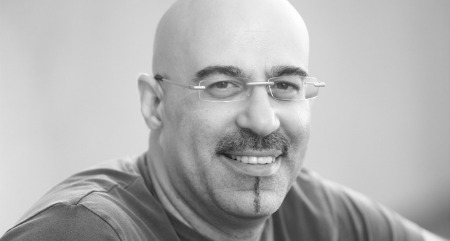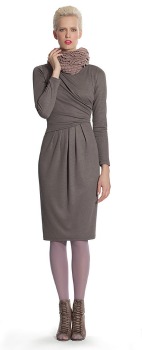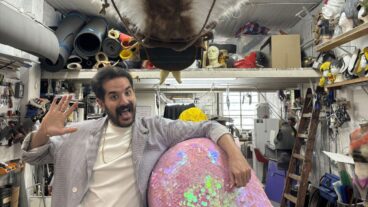He planned for a career in architecture, but moved into fashion instead. Now Ronen Chen’s designs are on sale all over the world.

A Ronen Chen outfit on a Los Angeles woman might look quite different than a Ronen Chen outfit on a New Yorker or an Israeli.
That’s because Chen, one of Israel’s most successful designers, is highly attuned to geographic differences in taste: New Yorkers favor black. Californians prefer color. Dutch and Canadian women like a warm look. Israelis, not surprisingly, are closer in fashion tastes to California than big city New York.
Chen used to match designs to localities. Nowadays, “I just make a big collection and buyers can choose from it,” he tells ISRAEL21c. There are 17 Ronen Chen stores in Israel and one in London, while his label is found at an additional 40 to 50 stores in Israel and 400 stores in North American and European countries.
Regardless of regional preferences, Chen aims for each piece to be worn confidently and comfortably by women in the 30 to 55 age range no matter where they travel for business or pleasure.

“In fashion, you don’t sell just the clothes. You sell a dream,” says Chen.
Fell into fashion
It was never Chen’s dream to have a career in couture.
“There was absolutely nothing in my background that pointed to fashion design,” says the 46-year-old Chen, who was raised in metro Tel Aviv. “I thought I would be an architect, because I liked lines and geometric shapes and I knew how to draw.”
After high school and army service at a military prison, Chen was speaking with an old friend who was applying to the Shenkar College of Engineering and Design near his hometown.
“Why don’t you register me as well?” he asked on a whim. Following an entrance exam, he was accepted and decided to go for the sake of convenience. He was surprised to find he enjoyed it.

“I found myself liking the rhythm of designing things and seeing them after a few days rather than a few years,” as is the case in architecture. “I just did my homework and exams and got good grades. I never thought it would be what it is today.”
Chen was selling belts and shoes to Tel Aviv boutiques by his third year. “During my fourth year I made money making saleable designer fashions at affordable prices,” he says.
After graduating in 1993, he set up a one-man operation in his apartment.
“In the morning I would design, make a pattern and cut the fabric. Then I took a bus to my seamstress with what I had cut. She sewed it together, and I would go back home, press it and make buttons and buttonholes — and then go sell it.”
When he moved to a new apartment recently, Chen found a bag containing a few dresses from that era that he never got around to ironing. He was pleased to discover that the dresses are just as fashionable today.
Squares and triangles
Though he didn’t go into architecture in a literal way, Chen’s sense of geometry is evident in his creations. Each piece “starts with square-y, round-y, triangle-y shape,” as he puts it.

“When I design, it never begins with what is in fashion,” he relates. “It always begins with construction and shape. I go into my design room with a piece of fabric I like and start draping it on a mannequin.”
Every prototype garment is worn by one of his employees for a few hours to see how it feels and fits. “We wash it and live in it to be sure it’s flattering and comfortable.”
In 1994, Chen opened his first boutique on Sheinkin Street offering simple, sophisticated dresses priced for a middle-class budget. “When I graduated, I worked for a year for a couture house as an assistant, and then I designed for a cheap mass-market company. In those years in Israel, there was nothing in between. I wanted to make well-designed, inexpensive clothing to fill that gap.”
This successful formula allowed Chen to branch out to the international scene beginning with London and then other European countries, Canada and the United States, which is now his biggest market. He does trade shows twice a year in London and in New York, and smaller shows in LA and Chicago. He also participates in Israeli shows and was at Fashion Week Montreal in September.
Clothing his kids
Chen shares parenting responsibilities with the mother of his two daughters, aged two and five.
“I do everything with them – I take them to the beach and playgroup, I make clothes for them. Only for them. Sometimes they come to work with me and choose fabrics for me to use.”
Chen has no professional interest in kids clothing or menswear. “Men’s clothes never tickled me,” he says. “In women’s wear, there are always new shapes and fabrics – it’s more vivid.”
This spring, the largely monochromatic Chen line will feature splashes of mustard and rust, lime green and abstract prints in fluid fabrics sourced in Israel, India, Italy, France or Korea. Form-fitting styles will step aside in favor of oversized jackets and tunics.
Chen says he had many opportunities to relocate to London or New York, but he’s content in Israel. The climate suits him, he confides. “I couldn’t live in very cold places; it’s not human. I love the people and the atmosphere here. It’s a small industry but everything is more accessible.”













